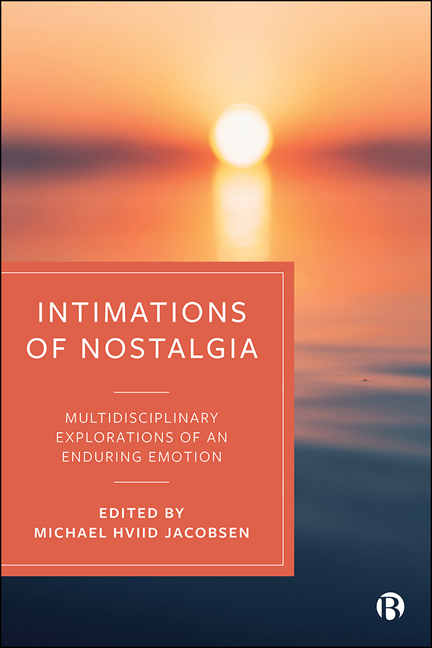Book contents
- Frontmatter
- Contents
- Notes on Contributors
- Preface and Acknowledgements
- Introduction: The Many Different Faces of Nostalgia – Exploring a Multifaceted and Multidisciplinary Emotion
- 1 Philosophy and Nostalgia: ‘Rooting’ within the Nostalgic Condition
- 2 History and Nostalgia: Historicizing a Multifaceted Emotion
- 3 Political Theory and Nostalgia: The Power of the Past in the History of Political Thought
- 4 Sociology and Nostalgia: Micro-, Meso-and Macro-level Dimensions of an Ambiguous Emotion
- 5 Psychology and Nostalgia: Towards a Functional Approach
- 6 Anthropology and Nostalgia: Between Hegemonic and Emancipatory Projections of the Past
- 7 Media Studies and Nostalgia: Media Philosophy and Nostalgizing in Times of Crisis
- 8 Marketing and Nostalgia: Unpacking the Past and Future of Marketing and Consumer Research on Nostalgia
- 9 Literature and Nostalgia: Vestiges of Paradise
- 10 Architecture and Nostalgia: The End of History, the End of the Future and the Prospect of Nostalgia
- Postscript: On Nostalgia of the Future and the Future of Nostalgia – Some Scattered Concluding Observations
- Index
Postscript: On Nostalgia of the Future and the Future of Nostalgia – Some Scattered Concluding Observations
Published online by Cambridge University Press: 13 May 2022
- Frontmatter
- Contents
- Notes on Contributors
- Preface and Acknowledgements
- Introduction: The Many Different Faces of Nostalgia – Exploring a Multifaceted and Multidisciplinary Emotion
- 1 Philosophy and Nostalgia: ‘Rooting’ within the Nostalgic Condition
- 2 History and Nostalgia: Historicizing a Multifaceted Emotion
- 3 Political Theory and Nostalgia: The Power of the Past in the History of Political Thought
- 4 Sociology and Nostalgia: Micro-, Meso-and Macro-level Dimensions of an Ambiguous Emotion
- 5 Psychology and Nostalgia: Towards a Functional Approach
- 6 Anthropology and Nostalgia: Between Hegemonic and Emancipatory Projections of the Past
- 7 Media Studies and Nostalgia: Media Philosophy and Nostalgizing in Times of Crisis
- 8 Marketing and Nostalgia: Unpacking the Past and Future of Marketing and Consumer Research on Nostalgia
- 9 Literature and Nostalgia: Vestiges of Paradise
- 10 Architecture and Nostalgia: The End of History, the End of the Future and the Prospect of Nostalgia
- Postscript: On Nostalgia of the Future and the Future of Nostalgia – Some Scattered Concluding Observations
- Index
Summary
All emotions have a past. All emotions have a present. All emotions have a future. This goes for emotions such as love, hate, indignation, despair, contempt, happiness, stress, depression, trust, anger, embarrassment, melancholy, hope, pride, shame, guilt, self-blame, anxiety, pain, fear, desire, loneliness, shyness, sadness, laziness, boredom, nostalgia and so on. All these emotions, and many more, have been there all along as part of human and social life, no matter whether we have been able to (or been interested to) name, analytically separate, study or understand them. True, the emotive epithets (and in some cases medical diagnoses) of ‘depression’, ‘melancholy’, ‘stress’, ‘loneliness’ or ‘nostalgia’ for that matter certainly did not exist in ordinary language during the Bronze Age or in medieval times – as was also the case with most of the other emotions mentioned here – but as labels for something that people might occasionally feel, depression, stress, melancholy, loneliness, nostalgia and so on have a much more extended history than their academic wording, definition and scrutiny might indicate. In this way, emotions – despite changes and transformations in how, where, why, when and towards whom we feel what – are an ever-present aspect of our human being-in-the-world. A world without emotions is therefore pure science fiction – no society, no culture and no relationship can function or acquire meaning unless emotions are a part of it.
A world entirely without emotions is thus impossible to imagine. The same goes for a world without nostalgia. It is utterly unimaginable, indeed pure science fiction, requiring nothing less than a gadget or technological device that would successfully be able to delete or render obsolete all human memories, recollections or longings. There is good reason to suspect that even if it was indeed possible to completely eradicate everything associated with memories of or longings for the past from its individual and collective storage in the hearts and minds of people as well as in historical artefacts, it would not be regarded as desirable, since the emotional importance attached to memory, remembrance, recollection and longing are all an integral part of human and cultural life. Nostalgia is perhaps not a constant in human life – as its social meaning, expression and embedding has changed quite considerably throughout history – but it is nevertheless something that has probably been there all along since time immemorial.
- Type
- Chapter
- Information
- Intimations of NostalgiaMultidisciplinary Explorations of an Enduring Emotion, pp. 229 - 243Publisher: Bristol University PressPrint publication year: 2021

